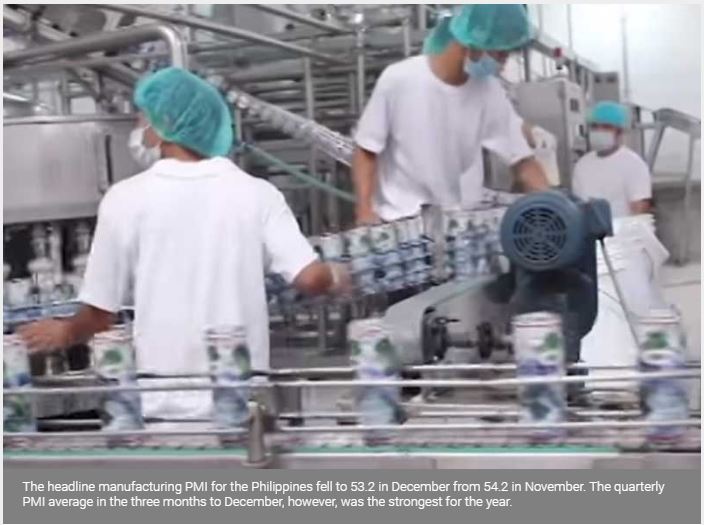Philippines: Manufacturing growth slows in December 2018
MANILA, Philippines — Manufacturing activities slowed in December as firms cut down on output and new orders, the latest reading of the Nikkei Philippines Manufacturing Purchasing Managers Index (PMI) showed.
The headline manufacturing PMI for the Philippines fell to 53.2 in December from 54.2 in November. The quarterly PMI average in the three months to December, however, was the strongest for the year.
The latest reading is still well above expansion territory as a gauge of below 50 indicates a deteriorating business condition. The index provides a quick assessment of the health of the manufacturing sector based on five indicators: new orders, output, employment, inventories and delivery times.
Despite the slower growth in output in December, this remained above the 2018 average as demand remained robust, said IHS Markit, the firm that compiled data for the survey. The domestic market played a primary role in driving demand amid soft export sales.
With sustained growth in sales, firms hired more workers to keep on top of the increase in workloads. Employment rose to its strongest level in four months in December as firms increase operating capacities.
Higher production requirements motivated firms to step up purchasing activity. Despite additional workloads, there were signs of spare capacity.
Supply chains remained stretched, with firms citing port congestions as the main reason for shipment delays.
On the price front, Filipino manufacturers raised prices modestly in December, in part because of slower rise in costs. Although still solid, cost inflation was the softest seen in two years. Higher prices for raw materials, a stronger dollar and the tax reform law remained the key factors behind inflation.
“The final survey of 2018 confirmed a strong end to the year for Filipino manufacturers. Despite dipping from November, output and new orders growth remained solid, while feeding a stronger increase to job numbers,” said David Owen, economist at IHS Markit.
“Also encouraging was a notable waning in input cost inflation to the weakest seen in over two years. Likely helped by the fall in oil prices, firms also reported an easing of recent cost pressures such as the exchange rate and the TRAIN laws. This in turn saw firms raising factory gate prices modestly, offering a calmer and confident outlook for the sector in 2019,” he added.
Purchasing managers surveyed for the PMI cited as reasons for optimism higher sales projections, new products, plants to expand operating capacity and the 2019 general elections.
Regionwise, the Philippine manufacturing sector was the second best performing in ASEAN next to Vietnam that registered a headline PMI reading of 53.8 in December. Other countries that registered expansions last month were Myanmar, Indonesia and Thailand. Experiencing declines, meanwhile, were Malaysia and Singapore.
ASEAN manufacturers saw a marginal improvement in operating conditions in December as seen in modest expansion in output.
The headline Nikkei ASEAN Manufacturing Purchasing Managers’ Index slowed down to 50.3 in December from 50.4 in November.
Activity was dampened by another weak uplift in new orders. Export orders continued to decline, with firms widely reporting a downturn in overseas demand.
Despite the weaker growth in output, firms were relieved of input cost pressures as input cost inflation weakened substantially in December amid falling oil prices. As a result, manufacturers also raised prices at the weakest pace in two years
“December’s survey of ASEAN manufacturers indicated that the recent fall in raw materials prices such as crude oil and metals translated into the weakest rise in input costs for over two years. The softer rate of inflation was undoubtedly welcomed by companies to help ease pressure on margins. Output growth remained marginal but relatively in line with the average for 2018, while new orders rose at a slightly faster rate,” said Owen.
Source: https://www.philstar.com/business/2019/01/03/1881777/manufacturing-growth-slows-december-2018#0x1fVGRlPlVSc94A.99


 Thailand
Thailand




